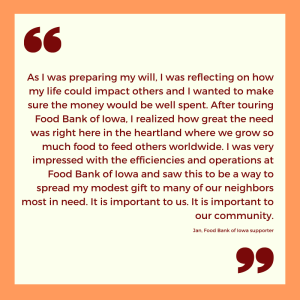Planned Giving: Your Legacy — Your Way
Planned charitable giving is something we all can do … it’s not just for the wealthy. Like so many people, you’d like to know that the causes and organizations you care about today will continue to thrive in the future. And with just a little planning, you can make that a reality.
A planned charitable gift is simple, easy to do, and can benefit both you and the charitable organization you would like to support. It will ensure that your philanthropic wishes are honored and allow you to leave a lasting legacy of hope.
WHAT EXACTLY IS PLANNED GIVING?
Planned Giving is the transfer of a designated portion of your assets to a charity of your choice during your lifetime or as part of an estate plan. You make it your personal plan by determining what you care about most and then deciding what you want your future charitable gifts to impact.
BENEFITS
• You can leave a lasting legacy to causes that are important to you.
• Depending on the type and amount of your gift, it may lessen the tax burden for you and your family.
• And because planned gifts are so flexible, they work to benefit both you and all chosen beneficiaries; existing side by side with other personal priorities.

IT DOESN’T HAVE TO BE DIFFICULT
Planned giving doesn’t have to be difficult, you don’t have to be wealthy to do it, and there are a variety of ways to leave a meaningful legacy. Always consult your financial/ legal advisor when planning.
COMMON APPROACHES TO GIVING
Beneficiary Designations: Most retirement plans, annuities, and life insurance policies let you decide in advance how your assets will be distributed after your death. They do this by asking you to designate beneficiaries, such as your favorite charity on a beneficiary designation form.
Donor-Advised Funds: Donor-advised funds are one of the fastest growing, easiest and most tax-advantageous ways to give to charity. They allow donors to make a charitable contribution, receive an immediate tax deduction, and then direct grants from the fund to their favorite charity whenever they choose. And donors can contribute to the fund as frequently as they like.
Gifts from an IRA: A simple, cost-effective way to benefit a charity of your choice and receive tax benefits is to use an IRA Charitable Rollover (Qualified Charitable Distribution.) If you are 70 ó years old or older, every year you can ask your IRA administrator to transfer up to $100,000 directly to a non-profit of your choice. Because your gift goes directly to a qualified charity, the IRA distribution is excluded from your adjusted gross income for income tax purposes.
Gifts of Appreciated Stock: You may be able to maximize your gift and your income tax deduction by donating long-term appreciated securities, including stocks, bonds, and mutual funds, directly to a charity. By donating appreciated stock directly to the charity, the donor avoids recognition of capital gain and eliminates any income tax resulting from the sale of the stock.
Living Trust or Will: Making a gift through your will or living trust is one of the easiest ways to give into the future. With your legal advisor’s assistance, you can include language designating family, friends, or your favorite charity as part of your estate plan. Even a small percentage can have a big impact.
Endow Iowa Fund: Contributing to Food Bank of Iowa’s Endow Iowa Fund allows you to make a gift to the future of Iowa while receiving a generous 25 percent state tax credit. Our Endow Iowa Fund is housed at the Greater Des Moines Community Foundation.
Where to begin if you would like to leave a lasting gift to the Food Bank of Iowa
• Determine what you want to accomplish with your charitable gift.
• Contact Food Bank of Iowa for additional information and to discuss how your wishes can make a lasting impact.
Please contact: Bergetta Beardsley, 515-867-2892, or bbeardsley@foodbankiowa.org
• Always consult with your financial and legal advisors to decide the best approach to achieve your goals.
